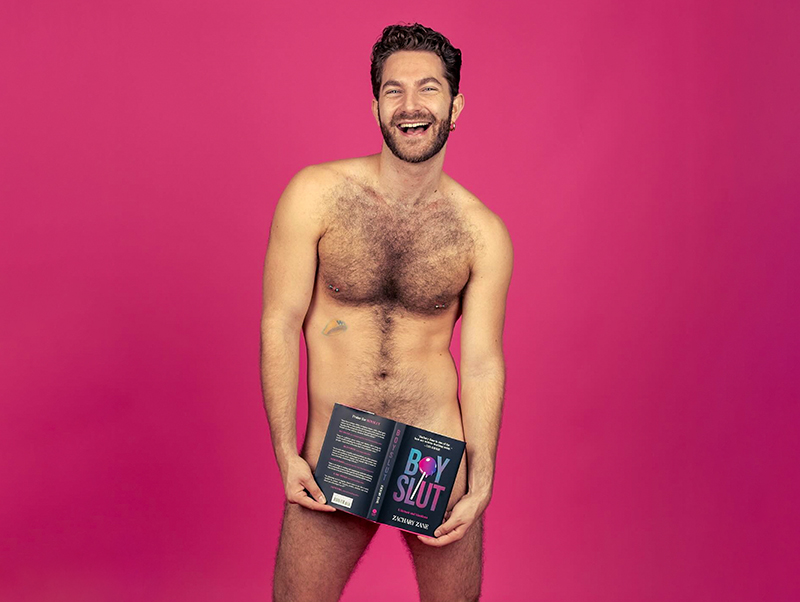Ending the Gay Blood Ban: Why the FDA’s Changes Aren’t Enough
The FDA has reduced its celibacy requirement for gay men wishing to donate blood. Critics say it still discriminates.

“I remember the first time I went to donate blood as an adult, in the late ’80s,” says Scott Wiener. “The questionnaire said if you’d had sex with a man since 1977, you couldn’t donate. I remember the feeling in the pit of my stomach, that I was permanently banned from donating blood for the rest of my life. It was really demoralizing, and made me feel like a second-class citizen.”
Wiener came of age as a gay man in 1987, when he was 17, at the height of the AIDS epidemic. “There was no effective treatment for HIV,” he says. “People were dying in obscene numbers. It was a very scary time to come to grips that I was gay.”
Now, almost 33 years later, the Democratic state senator from California who represents San Francisco, has seen the U.S. Food and Drug Administration move from permanently banning all men who have sex with men to, in 2015, allowing gay and bisexual men to donate 12 months after their last sexual encounter. Last week, the FDA again revised its policy on blood donations, reducing the deferral period to three months.
The policy change comes as health experts, including the U.S. Surgeon General Jerome Adams, warned that social distancing efforts to “flatten the curve” of the ongoing COVID-19 pandemic were drastically reducing the supply of available blood, and encouraged younger, healthier Americans to donate. In announcing the change, the FDA specifically cited the need for more blood donations amid the COVID-19 crisis, and said the changes “are expected to remain in place after the COVID-19 public health emergency ends.”
For Wiener, the lower deferral period for gay and bisexual men — and those individuals who have sex with them, including transgender people and cisgender women — might be a step in the right direction, but it’s still not enough.
“Yes, one year of celibacy is less terrible than a lifetime ban, and three months of celibacy is less terrible than a year, but it’s all terrible,” he says. “And none of it is based in science, none of it is rational, and it’s all completely discriminatory.
“We know that every blood donation is tested for HIV and the RNA test for HIV has a mere 10-to-14-day window. So unless that person seroconverted within a week-and-a-half to two weeks before giving, the test will screen that blood out. Given that, why would you require even three months of celibacy when the resting window is 10 to 14 days?
“There’s no conceivable, rational explanation for that rule. It’s simply based on outdated stereotypes, and frankly, animus towards gay and bi men, assuming we’re all disease vectors, we’re all filthy, that gay sex is dirty,” Wiener says. “It’s just tragic that the FDA, which is supposedly a scientific organization, is ignoring the science on blood donation. And yet you could be a sexually active, non-monogamous straight person, and none of this would apply to you.”
Wiener is in favor of moving to behavioral-based screening for all donors.
“The FDA should either adopt behavioral screening, or an across-the-board celibacy period for everyone if they believe that is necessary,” he says. “Because there are a lot of gay men who aren’t having that much sex, and straight people who are having sex all the time.”
Wiener admits that adopting an across-the-board celibacy period is unlikely because it could severely impair the available blood supply, but testing and self-screening — which he believes most prospective donors are responsible enough to do — is enough to protect the blood supply from any bloodborne diseases like HIV or hepatitis.
On Tuesday, Wiener hosted a blood drive at San Francisco’s Zellerbach Rehearsal Hall, which he called the #GiveforaGay blood drive, to bring attention to the FDA’s restrictions even with the lower deferral period being adopted.
“As soon as I saw that the call for social distancing was affecting blood donations, I knew we wanted to increase the supply of blood, while also reminding people that a segment of the population is irrationally prohibited from giving,” says Wiener. “So I said ‘Let’s work with the Red Cross, hold a blood drive, and call attention to this issue.'”
Like Wiener, many LGBTQ activists see the FDA’s recent announcement as positive progress, but feel it doesn’t go far enough in reducing the stigma around gay and bisexual men — as well as other LGBTQ individuals who wish to donate.
“Under the new guidelines, a person who has had unprotected sex only days before can still donate blood, while a gay or bisexual man who has had sex with another man within three months of the date of donation — despite using condoms and taking HIV prevention medicine like PREP — cannot,” Alphonso David, the president of the Human Rights Campaign, said in a press call following the announcement. “This difference is unfair, and based in bias.
“Deferral should be based on information that is within the personal knowledge and control of the prospective donor,” he added, “and not on the sexual orientation or gender identity of the donor, or the sexual orientation, gender identity, or activities of one’s sexual partners, or on perceived monogamy.”

U.S. Sen. Tammy Baldwin (D-Wis.), who also participated in the call, welcomed the new deferral period as a “milestone” in the fight for equality when it comes to blood donation policies, while saying it still falls short.
“I think about the fact that we want our policies on this public health crisis to be informed by the best scientific expertise, the best public health information,” she said. “Likewise, we should demand that about the policies that govern our blood supply in the United States.
“Ending discriminatory blood donation policies is something I’ve been engaged in for many years and ensure that all healthy individuals are able to donate,” noted Baldwin. “It shouldn’t have taken a pandemic and the resulting blood shortage to make progress on this issue.”
U.S Rep. David Cicilline (D-R.I.), who is gay, expressed similar sentiments in a statement.
“Gay and bisexual men should be able to donate blood just like every other American,” Cicilline said. “The change announced this week is a step forward, but the restrictions in place are still discriminatory. I’m going to continue fighting until all LGBTQ Americans are equal in the eyes of the law.”
Mathew Lasky, director of communications for the LGBTQ media advocacy organization GLAAD, says even with the lower deferral period that there are going to be large numbers of gay and bisexual men who will be unable to donate, even if they’re involved in a committed, monagamous relationship.
“The new deferral period is more in line with science than the previous policy, but you have some scientists pushing [the idea] that there is no need for time-based deferral periods at all, and that they don’t help in ensuring blood safety,” he says.
If the United States were to eliminate time-based deferrals and move to a behavioral-based screening of potential blood donors, as have countries like Italy, Lasky says, the way it would work is that all potential donors would fill out a questionnaire asking about their sexual practices and health history. Based on those responses, whoever was administering the survey would determine who was eligible to donate. Blood collected from donors would then be screened for HIV and other sexually transmitted infections, as it is presently.
Jason Cianciotto, the senior managing director of the New York-based Gay Men’s Health Crisis, cites GMHC’s decade-long work of fighting against what, at the time, was a lifetime ban for gay and bisexual blood donors. He says the organization favors moving to a screening policy that would defer anyone at risk of having contracted HIV in the 10-to-14-day window before the virus is detectable in their blood, regardless of their sexual orientation.
“I think our work began in earnest in 2010 when GMHC published and released a report that made the case, based on the information at the time, that a lifetime deferral for all gay and bisexual men, simply because of their sexual orientation, was not warranted, was not rooted in the best available science, and, in fact, was harmful because it promoted the stereotype that HIV is a gay disease,” Cianciotto says.

“The consequences of that stereotype extends far beyond just the harm done in preventing a large number of people from being able to donate blood and blood products,” he adds. “It carries forward one of the most harmful social determinants of the epidemic, by promoting the idea, especially to LGBTQ youth, that because of their sexual orientation, they are diseased and are going to get some kind of deadly illness.”
GMHC was among a number of LGBTQ groups who spoke out against the FDA’s 12-month deferral period when it was introduced in 2015, criticizing it for being “akin to a lifetime ban” because it was not realistic to expect people to remain abstinent for an entire year simply so they would be able to donate blood.
“Within the context of COVID-19, the deferral period takes on a deeper and more harmful significance,” notes Cianciotto. “Not only do the effects of COVID-19 ravage the lungs so that someone is in need of blood, but physical and social distancing have also meant a reduction in the number of people donating blood.
“One of the most promising treatments that can help someone who is severely threatened by COVID-19 is the process of extracting antibodies from [recovered patients’] blood plasma,” he says. “The FDA’s ban prevents men who have sex with men from donating plasma as well.”
Cianciotto takes issue with the FDA’s framing of its new, three-month deferral period as somehow revolutionary or groundbreaking.
“The FDA, in announcing its three-month ban, spoke as if there was new science that led them to adopt this temporary policy, when in fact, England has been doing it since 2017,” he says. “In 2001, Italy removed its ban entirely and moved to a risk-based screening tool. And the research that has been done in Italy has shown no increase in bloodborne disease transmissions during that time.”
Another person who finds the FDA’s current deferral period ludicrous is Peter Adams, of Fairfax, Virginia. A 32-year-old gay man, Adams notes that he has always been willing to help out, and was upset that he was unable to respond to the Surgeon General’s call for millennials and members of Generation Z to donate blood to address the pending shortages.
“I felt I was missing out on a call to action that I think is important,” he says.
He notes that his sexual orientation does not prevent him from being an organ donor. Additionally, gay and bisexual men have been allowed to donate bone marrow and other tissue for a few years, after restrictions prohibiting were relaxed in late 2015 following guidance from the FDA.
“If you look at my driver’s license, it says I’m an organ donor, because, when I die, I want to be able to save as many people as possible with my organs, if they’re healthy,” says Adams.
Adams, who last donated blood as a 17-year-old, was unimpressed by the FDA’s recent decision, and wishes the regulatory agency had made bolder moves.
“That’s nothing,” he says. “If you wanted to make a real change, you’d say to gay men, ‘We’re going to take your blood.’ What really grinds my gears is that this all stems from the AIDS epidemic. AIDS is not a gay disease, anyone can have AIDS. On top of that, if you do donate blood, regardless of where the blood came from, guess what they’re going to do? They’re going to test it.
“My older brother is gay and has been married to his husband for several years,” says Adams. “And you’re telling me that they have to abstain from sex for three months just to donate blood? You’ve got to be kidding me. I want to help everyone else as much as they want my blood. But you’re effectively telling me it’s bad blood.”
After a moment of reflection, he concedes that even “baby steps” like reducing the deferral period are a form of slow-moving progress.
“Any step forward is a step in the right direction,” he says. “I only wish it had been a lot bigger.”
For more information on the FDA’s blood donation guidelines, visit fda.gov/vaccines-blood-biologics.
Support Metro Weekly’s Journalism
These are challenging times for news organizations. And yet it’s crucial we stay active and provide vital resources and information to both our local readers and the world. So won’t you please take a moment and consider supporting Metro Weekly with a membership? For as little as $5 a month, you can help ensure Metro Weekly magazine and MetroWeekly.com remain free, viable resources as we provide the best, most diverse, culturally-resonant LGBTQ coverage in both the D.C. region and around the world. Memberships come with exclusive perks and discounts, your own personal digital delivery of each week’s magazine (and an archive), access to our Member's Lounge when it launches this fall, and exclusive members-only items like Metro Weekly Membership Mugs and Tote Bags! Check out all our membership levels here and please join us today!



























You must be logged in to post a comment.